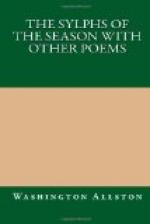Or seen at dawn of eastern light
The frosty toil of Fays by night
On pane of casement clear,
Where bright the mimic glaciers shine,
And Alps, with many a mountain pine,
And armed knights from Palestine
In winding march appear:
’Twas I on each enchanting scene
The charm bestow’d that banished spleen
Thy bosom pure and light.
But still a nobler power I claim;
That power allied to poets’ fame,
Which language vain has dar’d to name—
The soul’s creative might.
Though Autumn grave, and Summer fair,
And joyous Spring demand a share
Of Fancy’s hallow’d power,
Yet these I hold of humbler kind,
To grosser means of earth confin’d,
Through mortal sense to reach the mind,
By mountain, stream, or flower.
But mine, of purer nature still,
Is that which to thy secret will
Did minister unseen,
Unfelt, unheard; when every sense
Did sleep in drowsy indolence,
And Silence deep and Night intense
Enshrowded every scene;
That o’er thy teeming brain did raise
The spirits of departed days[1]
Through all the varying year;
And images of things remote,
And sounds that long had ceas’d to float,
With every hue, and every note,
As living now they were:
And taught thee from the motley mass
Each harmonizing part to class,
(Like Nature’s self
employ’d;)
And then, as work’d thy wayward will,
From these with rare combining skill,
With new-created worlds to fill
Of space the mighty void.
Oh then to me thy heart incline;
To me whose plastick powers combine
The harvest of the mind;
To me, whose magic coffers bear
The spoils of all the toiling year,
That still in mental vision wear
A lustre more refin’d.
She ceas’d—And now in doubtful mood,
All motionless and mute I stood,
Like one by charm opprest:
By turns from each to each I rov’d,
And each by turns again I lov’d;
For ages ne’er could one have prov’d
More lovely than the rest.
“Oh blessed band, of birth divine,
What mortal task is like to mine!”—
And further had I spoke,
When, lo! there pour’d a flood of light
So fiercely on my aching sight,
I fell beneath the vision bright,
And with the pain I woke.
The Two Painters: A Tale.
Say why in every work of man
Some imperfection mars the plan?
Why join’d in every human art
A perfect and imperfect part?
Is it that life for art is short?
Or is it nature’s cruel sport?
Or would she thus a moral teach;
That man should see, but never reach,
The height of excellence, and show
The vanity of works below?
Or consequence of Pride, or Sloth;
Or rather the effect of both?
Whoe’er on life his eye has cast,
I fear, alas, will say the last!




